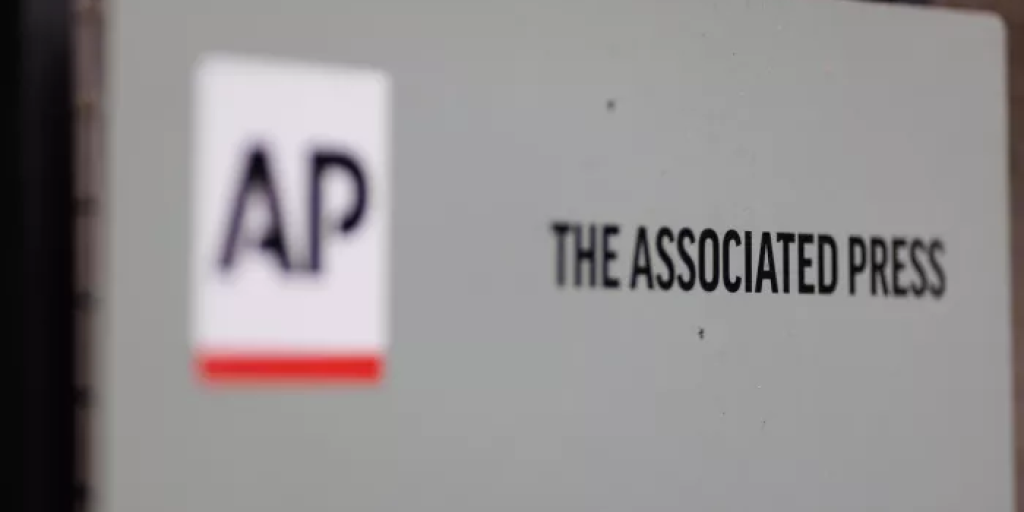‘Viewpoint discrimination’ as White House bars major news agency from press events
A widening gulf has opened between the Trump administration and the Associated Press.
Which gulf?
Precisely.
On Tuesday 11 February, the AP said the White House blocked one of its reporters from attending an event in the Oval Office because the outlet continues to use the name Gulf of Mexico in its reporting. This, despite President Donald Trump’s recent executive order renaming it the Gulf of America.
After Trump signed that order, the AP announced it would continue referring to the gulf by its original name ‘while acknowledging the new name Trump has chosen’. It did so in part because the gulf borders other countries that don’t recognise the name change. (The AP did update its Stylebook to reflect Trump’s separate decision to revert the name of North America’s highest mountain, which President Barack Obama changed to the native moniker Denali, to Mount McKinley because that ‘area lies solely in the United States’.)
In a Wednesday briefing, Press Secretary Karoline Leavitt confirmed the AP’s allegations, saying, ‘I was very up front in my briefing on day one that if we feel that there are lies being pushed by outlets in this room, we are going to hold those lies accountable … And it is a fact that the body of water off the coast of Louisiana is called the Gulf of America’.
The standoff continues – and has escalated beyond Oval Office events. Last night, the White House blocked the AP from an open press conference featuring Trump and Indian Prime Minister Narendra Modi.
FIRE issued a statement condemning the administration’s actions, which have drawn criticism from press freedom groups, pundits, and politicians across the political spectrum.
In a letter to White House Chief of Staff Susie Wiles, AP Executive Editor Julie Pace called the administration’s actions ‘viewpoint discrimination based on a news organisation’s editorial choices and a clear violation of the First Amendment’. She’s right
To be sure, the First Amendment does not require the White House to open its doors to the media or hold press conferences. Nor does the president have to do a one-on-one interview with CNN just because he did one with Fox News.
But court decisions spanning decades make clear that once the government grants media access, it has to play by constitutional rules.
That doesn’t mean the White House has to allow every reporter in the world into the Oval Office or briefing room. Space constraints obviously make that impossible, and not every journalist will manage to secure a press pass. But the reason for denying access matters.
When the government shuts out journalists explicitly because it dislikes their reporting or political views, that violates the First Amendment.
As one federal court proclaimed, ‘Neither the courts nor any other branch of the government can be allowed to affect the content or tenor of the news by choreographing which news organisations have access to relevant information’.
And because denying press access involves the potential deprivation of First Amendment rights, any decision about who’s in or out must also satisfy due process. That means the government must establish clear, impartial criteria and procedures, and reporters must receive notice of why they were denied access and have a fair opportunity to challenge that decision.
The AP – a major news agency that produces and distributes reports to thousands of newspapers, radio stations and TV broadcasters around the world – has had long-standing access to the White House. It is now losing that access because its exercise of editorial discretion doesn’t align with the administration’s preferred messaging
That’s viewpoint discrimination, and it’s unconstitutional.
This isn’t the first time the White House has sent a journalist packing for reporting critically, asking tough questions, or failing to toe the government line. During Trump’s first term, the White House suspended CNN reporter Jim Acosta’s press pass after he interrogated the president about his views on immigration.
After the network sued, a federal court ordered the administration to restore Acosta’s pass.
But court decisions spanning decades make clear that once the government grants media access, it has to play by constitutional rules.
Democratic administrations have also unacceptably targeted disfavoured outlets for exclusion. The Obama administration tried to exclude Fox News from a press pool because of displeasure with its coverage. Obama’s deputy press secretary Josh Earnest said at the time, ‘We’ve demonstrated our willingness and ability to exclude Fox News from significant interviews’.
Similar attacks on press freedom happen at all levels of government. In 2022, FIRE filed an amicus curiae brief in a First Amendment lawsuit challenging vague and arbitrary press pass rules that Arizona elections officials used to block a Gateway Pundit journalist from press conferences.
The officials didn’t like the conservative journalist’s political views or negative coverage, including his ‘inflammatory and/or accusatory language’. After the U.S. Court of Appeals for the Ninth Circuit initially ruled in favour of The Gateway Pundit, the outlet received a $175 000 settlement.
The current spat over naming conventions for a body of water may seem trivial. But it sends a chilling message to all journalists that White House access hinges on whether the president approves of their reporting.
Left unchecked, such a precedent opens the door to broader efforts to manipulate public discourse and undermine press freedom. What other ‘lies’ might the Trump administration hold media outlets ‘accountable’ for? Could scrutiny of its immigration policies, economic performance, or claims about election integrity be next?
The characterisation of the AP’s editorial style choice as a ‘lie’ shows the danger of empowering the state to police mis- or disinformation. The Chinese government might say the same about anyone who calls a certain territory ‘Taiwan’ instead of the ‘Republic of China’ or ‘Chinese Taipei’.
To a government official with a misinformation hammer, every deviation from official messaging looks like a nail. We saw enough misguided attempts to police ‘misinformation’ during the Biden administration. Let’s leave that behind.
In an executive order signed the same day as the one renaming the gulf, Trump promised to ‘ensure that no Federal Government officer, employee or agent engages in or facilitates any conduct that would unconstitutionally abridge the free speech of any American citizen’. That’s a good policy, and the administration should stick to it – the First Amendment requires no less.
Any government attempt to control the flow of information strikes a blow at the First Amendment
A free press performs a vital democratic function – gathering, curating and delivering information, which we can then evaluate for ourselves. Without the Fourth Estate acting as a crucial check on government power, we’ll know less about what our elected officials are up to, and face greater difficulty holding them accountable.
The beauty of this country’s ideologically diverse media landscape is that if you distrust a particular source, countless others are available offering different information and perspectives.
Preserving this rich information ecosystem demands constant vigilance against any threats to free speech and a free press, regardless of who the target is. The alternative – no matter what name you give it – is censorship.
- This article was first published here
- The mission of The Foundation for Individual Rights and Expression (The FIRE) is ‘to defend and sustain the individual rights of all Americans to free speech and free thought’




